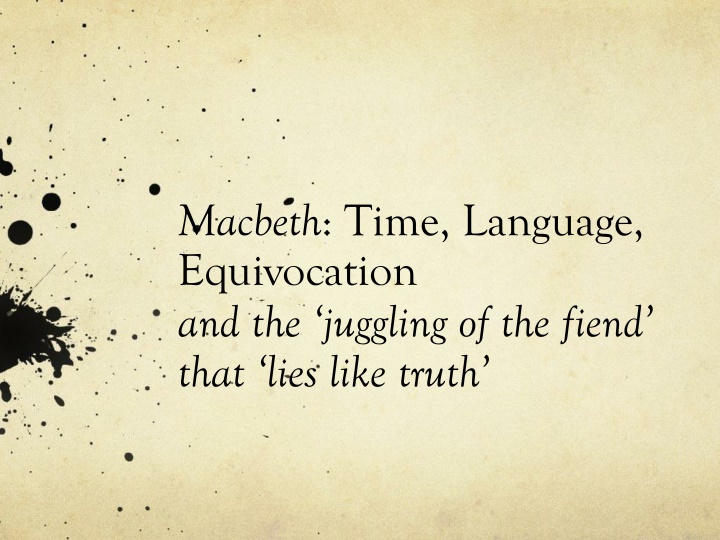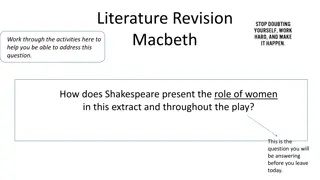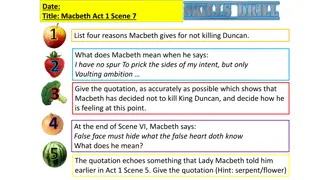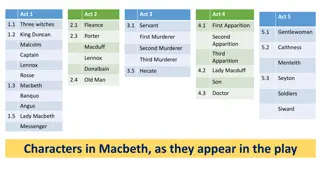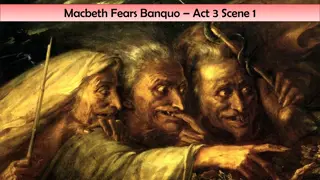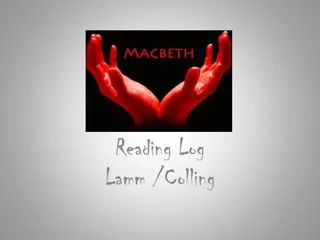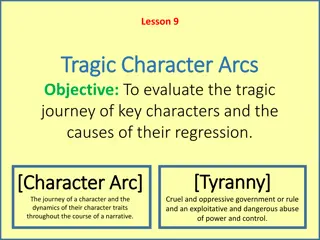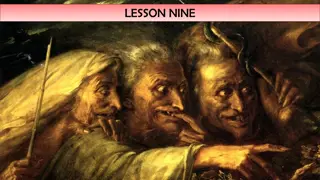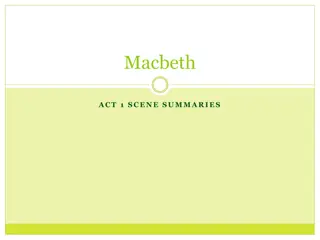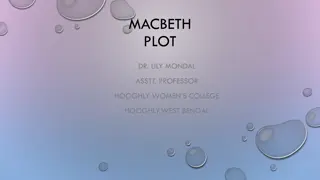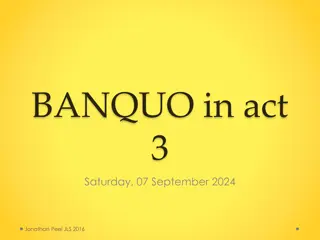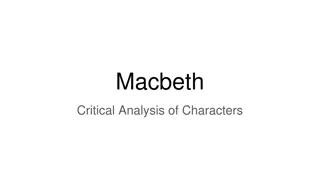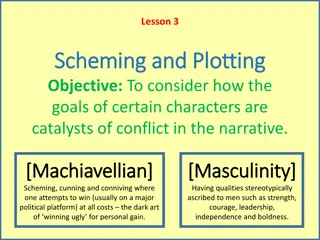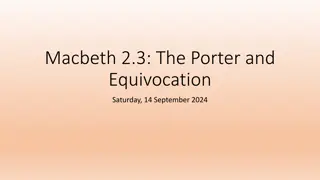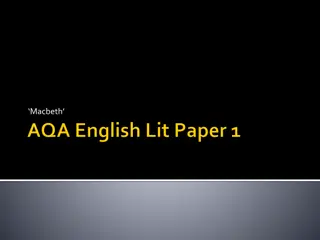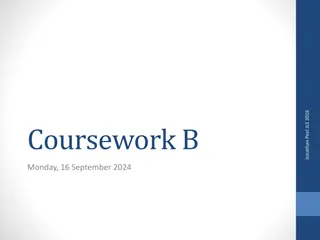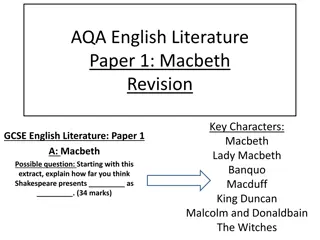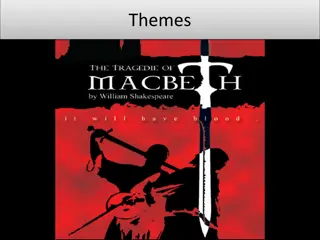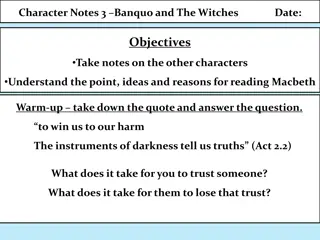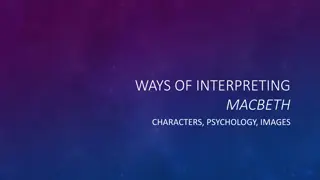Analysis of Time, Language, and Equivocation in Macbeth
The play Macbeth explores intricate themes of time, language, and equivocation through vivid characters and dramatic dialogue. The protagonist, Macbeth, grapples with moral dilemmas, as seen in key scenes like Lady Macbeth's infamous hand-washing. The witches' cryptic statement, "Fair is foul, and foul is fair," sets the tone for the play's theme of deception. Through powerful language and complex characters, Shakespeare navigates the psychological depths of ambition and consequence.
Download Presentation

Please find below an Image/Link to download the presentation.
The content on the website is provided AS IS for your information and personal use only. It may not be sold, licensed, or shared on other websites without obtaining consent from the author.If you encounter any issues during the download, it is possible that the publisher has removed the file from their server.
You are allowed to download the files provided on this website for personal or commercial use, subject to the condition that they are used lawfully. All files are the property of their respective owners.
The content on the website is provided AS IS for your information and personal use only. It may not be sold, licensed, or shared on other websites without obtaining consent from the author.
E N D
Presentation Transcript
Macbeth: Time, Language, Equivocation and the juggling of the fiend that lies like truth
If it were done when tis done, then twere well If it were done quickly. If the assassination Could trammel up the consequence, and catch With his surcease success that but this blow Might be the be-all and the end-all! here, But here, upon this bank and shoal of time, We d jump the life to come. But in these cases We still have judgement here that we but teach Bloody instructions, which, being taught, return To plague the inventor. This even-handed justice Commends the ingredience of our poisoned chalice To our own lips. He s here in double trust (1.7.1-12)
Doctor: You see her eyes are open. Gentlewoman: Ay, but their sense are shut. Doctor: What is it she does now. Look how she rubs her hands. Gentlewoman: It is an accustomed action with her to seem thus washing her hands. I have known her continue in this a quarter of an hour. Lady Macbeth: Yet here s a spot. Doctor: Hark! She speaks. I will set down what comes from her, to satisfy my remembrance the more strongly. Lady Macbeth: Out, damned spot! Out I say! One, two: why then, tis time to do it. Hell is murky! Fie,my lord, Fie! A soldier and afeard? What need we fear who knows it when none can all our power to accompt? Yet who would have thought the old man to have had so much blood in him? Doctor: Do you mark that? Lady Macbeth: The Thane of Fife had a wife; where is she now? What, will these hands n er be clean? No more o that, my lord, no more o that. You mar all with this starting. Doctor: Go to, go to: you have known what you should not. Gentlewoman: She has spoke what she should not, I am sure of that. Heaven knows what she has known. Lady Macbeth: Here s the smell of the blood still. All the perfumes of Arabia will not sweeten this little hand. Oh, oh, oh! Wash your hands; put on your nightgown; look not so pale. I tell you again Banquo s buried. He cannot come out on sgrave . To bed, to bed! There s knocking at the gate. Come, come, come come, give me your hand. What s done cannot be undone. To bed, to bed, to bed. (5.1.25-64)
Weird Sisters: Fair is foul, and foul is fair (1.1.9. Duncan: Is execution done on Cawdor?... There s no art to find the mind s construction in the face. He was a gentleman on whom I built An absolute trust (1.4.1, 12-14). Banquo: The temple-haunting martlet, does approve By his loved mansionry that the heaven s breath Smells wooringly here Where they most breed and haunt I have observed The air is delicate (1.6.3-10). This guest of summer, Macduff: I am not treacherous. Malcolm: That which you are my thoughts cannot transpose. Angels are bright still though the brightest fell. Though all things foul would wear the brows of grace, Yet grace must still look so (4.3.18-24) I shall crave your pardon. But Macbeth is
Captain: The merciless Macdonwald Worthy to be a rebel, for to that The multiplying villainies of nature Do swarm upon him from the Western isles Of kerns and gallowglasses is supplied (1.2.9-13).
Macbeth: Duncan comes here tonight. Lady Macbeth: Macbeth: Tomorrow, as he purposes. Lady Macbeth: O never Shall sun that morrow see! My dearest love, And when goes hence? * * * * * (1.5.56-59) Macbeth: I have done the deed. Didst thou not hear a noise? Lady Macbeth: I heard the owl-scream and the cricket s cry. Did you not speak? Macbeth: When? Lady Macbeth: Macbeth: Lady Macbeth: Ay. Macbeth: Hark! Now. As I descended? (2.2.14-17)
Lady Macbeth: Say to the king I would attend his leisure For a few words How now, my lord, why do you keep alone? Macbeth: O, full of scorpions is my mind, dear wife! Thou know st that Banquo and his Fleance lives. Lady Macbeth: But in them nature s copy s not eterne. Macbeth: There s comfort yet. They are assailable [tonight] there shall be done A deed of dreadful note. Lady Macbeth: What s do be done? Macbeth: Be innocent of the knowledge, dearest chuck, Till thou applaud the deed Thou marvell st at my words, but hold thee still. Things bad begun make strong themselves by ill. So, prithee, go with me (3.2. You must leave this.
Macbeth: I am in blood Stepped in so far, that, should I wade no more, Returning were as tedious as go o er. Strange things I have in head, that will to hand; Which must be acted ere they may be scanned. Lady Macbeth: You lack the season of all natures, sleep. Macbeth: Come, we ll to sleep. My strange and self-abuse Is the initiate fear that wants hard use. We are yet but young in deed (3.4.135-144)
Messenger: The queen, my lord, is dead. Macbeth: She should have died hereafter. There would have been a time for such a word Tomorrow, and tomorrow, and tomorrow, Creeps in this petty pace from day to day To the last syllable of recorded time; And all our yesterdays have lighted fools The way to dusty death. Out, out, brief candle! Life s but a walking shadow, a poor player That struts and frets his hour upon the stage And then is heard no more. It is a tale Told by an idiot, full of sound and fury, Signifying nothing (5.5.15-28).
Macbeth: I bear a charmd life which must not yield To one of woman born. Macduff: And let the angel whom thou still hast served Tell thee Macduff was from his mother s wmb Untimely ripped. Macbeth: Accurs d be that tongue that tells me so; For it hath cowed my better part of man; And be these juggling fiends no more believed That palter with us in a double sense, That keep the word of promise to our ear And break it to our hope (5.6.51-61). Despair thy charm,
Banquo: How goes the night, boy? Theres husbandry in heaven: Their candles are all out A heavy summons lies like lead upon me And yet I would not sleep. Merciful powers Restrain in me the cursed thoughts that nature Gives way to in repose (2.1.1-9). * * * * * * Ross: Your castle is surprised, your wife and babes Savagely slaughtered Macduff: My children too? My wife killed too? He has no children. All my pretty ones? Did you say all? O hell-kite! All? What, all my pretty chickens And their dam at one fell swoop? Did heaven look on And would not take their part? (4.3.204 223).
